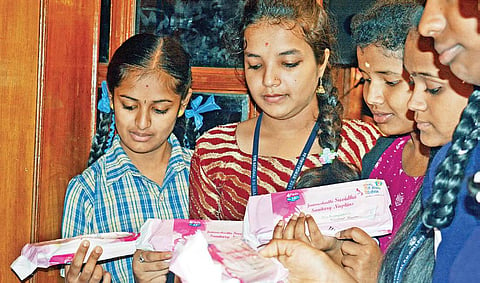

BENGALURU: On the occasion of World Environment Day, Ananth Kumar, Union Minister of Chemicals and Fertilizers and Parliamentary Affairs, on Tuesday, launched the Pradhan Mantri Bharatiya Jan (PMBJ) Aushadhi Suvidha Oxo-Biodegradable Sanitary Napkins. Only 48% of women use sanitary napkins. For the rest 52%, it is unaffordable.
These napkins are priced at a modest Rs 2.50 per piece. Jan Aushadhi Suvidha comes with a special additive, which makes it biodegradable when it comes in contact with oxygen after being discarded. It is available in all PMBJ Pariyojana kendras in the city. There are more than 3,600 PMBJ Pariyojana kendras functional in 33 states and union territories across the country. Over 1,13,000 lakh tonnes of sanitary napkins are used every year, which hardly decompose. Suvidha pads decompose in six months, due to it being oxo-biodegradable in nature.
Kumar said this initiative of the government will prove as an important step in ensuring the health security of the section of women in India who still use unhygienic aids during menstruation due to unaffordability.
As per the National Family Health Survey 2015-16 data, 57% of girls and women in the age group of 15-24 years have access to hygienic products to manage their menstruation.
It is estimated that a woman uses up to 10,000 sanitary pads during her reproductive age. Most sanitary pads contain a lot of plastic. Each pad may take 500-800 years to decompose. But the costs of scientifically-managed incineration are prohibitive, with bio-medical waste incineration firms charging as much as Rs 22/kg of sanitary waste in Bengaluru. The city alone generates 90 tonnes of menstrual waste per day.
PC Mohan, Bangalore Central MP, Sachin Singh, CEO of Bureau of Pharma Public Sector Undertakings of India, Navdeep Rinwa, Joint Secretary Department of Pharma, Neeraja Saraf, Managing Director of Karnataka Antibiotics and Pharmaceuticals Limited, were others who were present.